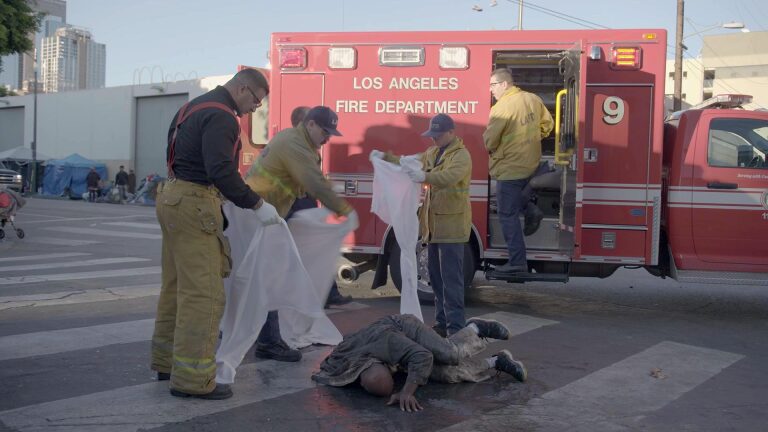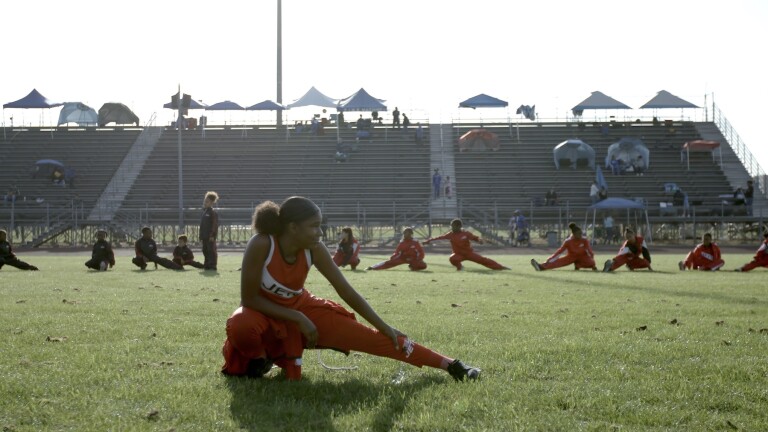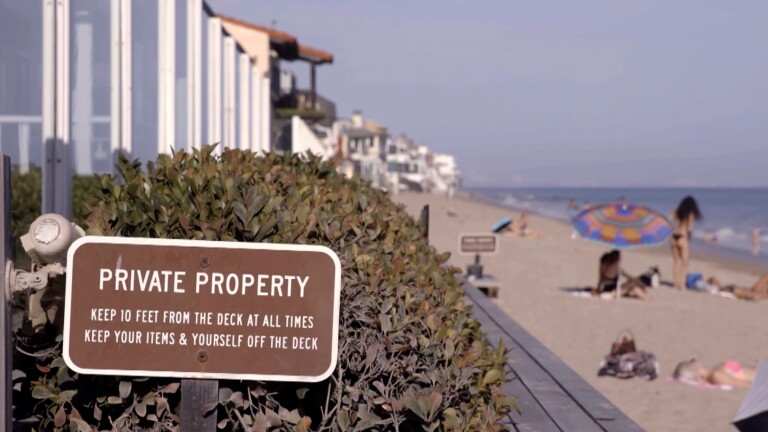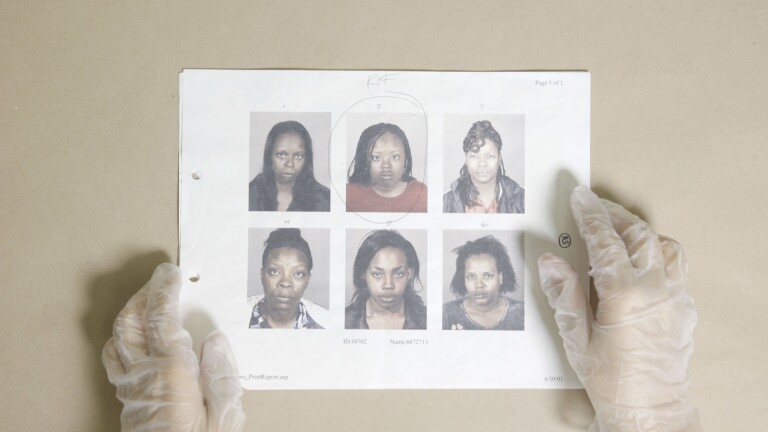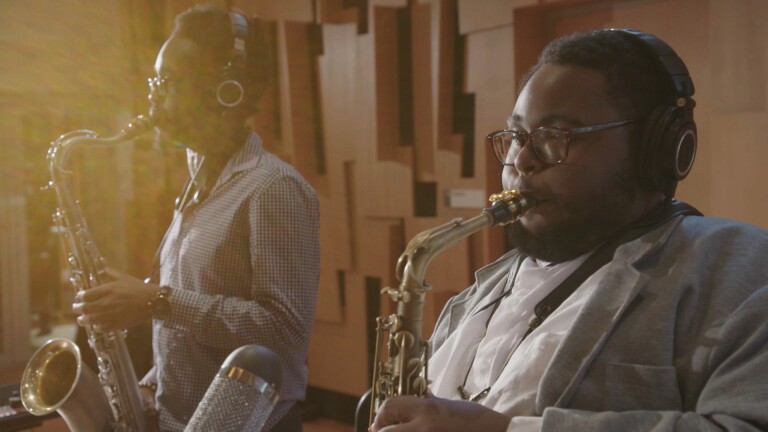Testing the Limits
TRANSCRIPT:
Val Zavala: Good evening. I'm Val Zavala. Tonight we look at a conflict with no resolution in sight. On one side, the scientists who experiment on animals. On the other side, animal rights activists who believe that no animal should ever be harmed. But how far can protesters go before their right to free speech threatens the scientists and their work?
But first, a warning: this report contains graphic language and images. Now, here's correspondent Michael Okwu.
[Protester: Ready, team?]
Michael Okwu: It's Saturday morning, and longtime animal rights activist Pam Ferdin is on the go, preparing to launch another round of monthly protests outside the homes of UCLA scientists who experiment on monkeys for biomedical research.
Pamelyn Ferdin: We want to educate the neighbors as to who they are living next to, just like if there was a pervert in your neighborhood.
[Protesters yelling: Your money, your fault! Blood money, your fault!]
Okwu: If the rhetoric sounds unbridled...
[Protesters yelling: Murderer!]
Okwu: ...it's because these days emotions seem to be running at an all-time high. Listen as Ferdin lashes out near the home of researcher Edith London, who is Jewish.
Ferdin: You can tell her that she's Hitler with a {expletive} or a vagina. Edith London is a Hitler with a vagina!
Okwu: Some extremists have gone well beyond rhetoric and waged war against the University of California. Ryan Levin, a criminal justice professor at California State University, San Bernardino, tracks extremism.
Brian Levin: Since about 2005, 2006, what has happened is that we've seen a ratcheting up, not only of the number of incidents &mdash we've had about a dozen or more serious incidents in UCLA alone, but the notion that we're not just going to attack property, the instrumentalities of the research, we're going to go after the people who are doing it. I believe it's only a matter of time before a researcher here in the United States and probably here in California will actually be hurt.
Okwu: Since 2006, animal rights extremists have claimed responsibility for three attempted bombings at the homes of UC scientists, three car bombings of UCLA scientists, the firebombing of a UCLA commuter van, numerous acts of vandalism, and an attempted home invasion of a UC Santa Cruz scientist during her child's birthday party. Of course, many, if not most, animal rights activists don't support violence, but the FBI says the larger eco-terror movement has caused well over $100 million in property damage and now ranks as a significant domestic terror threat.
Okwu: Researcher David Jentsch got his wakeup call in 2009, when his car was set on fire.
David Jentsch: At 4 o'clock in the morning, I woke up startled because there was a loud noise in my front yard, and by the time I got to a window where I could see what was going on outside, my car was engulfed in flames.
Okwu: And then in the fall of 2010, he got a vicious threat in the mail.
Jentsch: When I ripped the envelope open, razor blades fell out onto the floor. And inside were other razor blades and a letter that indicated the willingness of individuals to cut my throat.
Okwu: Federal authorities launched an investigation. A group called "The Justice Department at UCLA" claimed responsibility for the razor blades and even claimed they had been contaminated with AIDS.
Levin: What you have are small autonomous groups or lone wolves who go out and commit acts of violence.
[Nicoal Sheen yelling: David Jentsch is your neighbor! He does disgusting things to primates!]
Okwu: Nicoal Sheen is a spokesperson for the North American Animal Liberation press office. Sheen and others relay communiques from underground animal rights activists who commit acts of arson and vandalism in the name of their cause.
Okwu [to Sheen]: Let's be clear about this, they're firebombing cars?
Nicoal Sheen: Which have no sentience.
Okwu: They're sending razor blades to professors' offices and homes. They're harassing them in the middle of the night. If you listen to what the researchers say, I mean...
Sheen: If you call it "harassment," yes.
Okwu: So, do you concede that those things are happening, or do you...
Sheen: I am aware that those things are happening, yes.
Okwu: So laws are being broken.
Sheen: Yeah, but sometimes it takes illegal acts of those who are willing to risk their freedom. For example, you have people who wanted the abolishment of slavery &mdash the Underground Railroad.
Okwu: So, I want you to make sure I get this correctly. Does the organization condone this violence? Does it condemn it?
Sheen: Well, violence, violence is what's happening to the animals.
Okwu: To be clear, Sheen claims she doesn't know the identities of the extremists or have knowledge of their crimes before they're committed, but she believes she has an inkling why those razor blades were mailed to David Jentsch.
Sheen: First and foremost, it's because they're fed up and are taking desperate actions, and then in addition to that, say "Hey, look. We know where you live."
Okwu: And that's exactly what worries researchers. In a poll conducted by the journal Nature, 67 percent of biomedical scientists surveyed in the U.S. agreed or strongly agreed that activists posed a real threat to essential biomedical research. Thirty percent said they knew of somebody who had been negatively affected by activists, and 15 percent insist that, as a result, they changed the direction of their research.
UCLA neurobiology professor Dario Ringach is one of those scientists.
Dario Ringach: They started to visit us at home in the middle of the night, late hours of the night, after dark with very large numbers, between 20 and 40 people, all with masks, and they were banging on our windows, scaring my children.
Okwu: Ringach, who was studying the visual cortex of monkeys, says he decided his family was more important than his research.
[Protester: He's a sick, twisted...!]
Ringach: I acted to protect my family. I recognize that even though I have a responsibility to society to do my work as a scientist, I also have a responsibility to my family and to my children.
Okwu: And now, a warning: we're going to show you images you might find very disturbing. Activists point to underground video like this: here, facilities in Oregon and Virginia, where the monkeys appear to be traumatized. Ferdin and Sheen are convinced the public would see similar suffering at UCLA, if the university would only open its labs to cameras.
UCLA would not let us videotape, but it did release photos taken by a commercial photographer of Jentsch interacting with the monkeys. He says the animals are treated humanely &mdash that the experiments are regulated by the goverment and the university, and that the benefits to the mentally ill or drug-addicted are profound.
Jentsch: If you can look at people suffering and say "I am prepared to do nothing to address your suffering," there is already a big ethical question to me about that. Every single experiment that one feels it necessary to do is an independent example of ethical decision making. How important is this experiment? Is it justified in light of the harm that could be alleviated?
Okwu: Jentsch studies the biological origins of mental illness and addiction. He uses Vervet Monkeys like these in some if his experiments, injecting them with drugs and euthanizing them to study their brains. Jentsch says monkeys are essential because of their similarity to humans, but it's precisely that human likeness that can make the experiments all the more disturbing.
Jentsch: Let me say that I don't know a scientist that doesn't have regret over the loss of life in the course of scientific study. I don't know a single one.
Okwu: There are doctors and scientists who oppose the use of animals in biomedical research, but the majority agrees animal research has benefited humans. And they often point to stories like Veronica Jacobs, who suffered from dystonia, a debilitating neurological disorder that left her bound in a wheelchair until a surgical procedure conceived and perfected through testing on animals gave Veronica her life back.
Veronica Jacobs: I thought, "Wow, this is amazing. I can't believe this is happening to me."
Okwu: But for Nicoal Sheen and others, no animal's life is worth less than a human's.
Sheen: I would be out here if it was a rat. I'd be out here if it was a guinea pig, a bunny, a dog, a cat, a frog.
[Protesters yelling: David Jentsch has blood on his hands!]
Okwu: And so she plans to soldier on in the campaign she says educates the neighbors.
Sheen [to neighbor]: They should be informed and educated.
Neighbor: There's a World War II vet that lives right out here. He fought at Anzio. He took a bullet for this country, and you people are scaring him. He's got heart problems. He's 94 years old, and it's not fair to protest in front of his house. Go protest at UCLA. There's kids and old people out here.
Okwu: While we're speaking to Sheen, this same neighbor turns his garden hose on the other protesters.
[Protester yelling: We will not give up this fight!]
[Protester: We're gonna make sure they arrest you!]
Okwu: Police officers from UCLA are already on the scene. Protesters say they tail them at every demonstration. And four protesters have filed a lawsuit against the UC system for infringing upon their right to protest. They want to be closer to the researchers' homes.
Ferdin: We wanna march by David Jentsch's home, who murders and tortures primates with taxpayer dollars, and we wanna continue moving forward here educating the neighbors and going down this street.
Okwu: As for UCLA, it dismisses the lawsuit as a publicity stunt and says its officers protect free speech and the university's employees.
Protester [to police officer]: I'm a schoolteacher. This guy, he just assaulted a schoolteacher.
Okwu: Hovering over all of this is the very real threat of violence, violence Pam Ferdin says she doesn't commit but she doesn't condemn either.
Ferdin: I would agree that if somebody was taking either a human child or a primate, and sticking them in a steel cage, taking them out to torture, mutilate, and murder them, I would say that you need to stop that person by whatever means is necessary.
Okwu: By late afternoon, LAPD arrives to respond to several calls of disturbing the peace.
Ferdin [to police officer]: The Constitution trumps a person's...
Police Officer: We're not arguing that.
Ferdin: ...a person's feeling of being disturbed.
Police Officer: The penal code is disturbing the peace. We already let you know. We're giving you a heads up. It's up to you. If you wanna go ahead and continue, we're gonna have to take hands off.
Okwu: The protesters decide to move on.
Jentsch: It's a stalemate in the sense that activists have had a real impact on us. They have a personal impact on scientists. At the same time, science is going to progress, and it will progress, and discoveries will be made, and people's diseases will be addressed despite that activism.
Okwu: As for the activists, they say they're resolved to march another day. I'm Michael Okwu for SoCal Connected.

